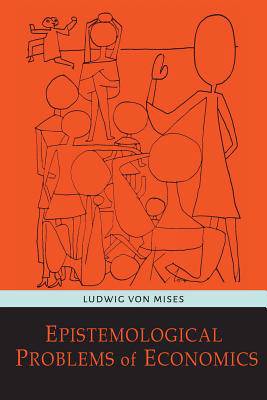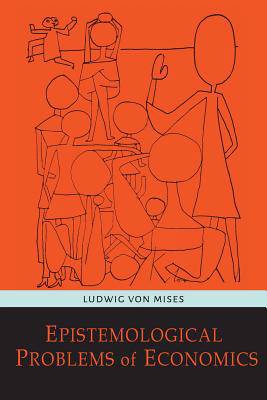
Je cadeautjes zeker op tijd in huis hebben voor de feestdagen? Kom langs in onze winkels en vind het perfecte geschenk!
- Afhalen na 1 uur in een winkel met voorraad
- Gratis thuislevering in België vanaf € 30
- Ruim aanbod met 7 miljoen producten
Je cadeautjes zeker op tijd in huis hebben voor de feestdagen? Kom langs in onze winkels en vind het perfecte geschenk!
- Afhalen na 1 uur in een winkel met voorraad
- Gratis thuislevering in België vanaf € 30
- Ruim aanbod met 7 miljoen producten
Zoeken
Omschrijving
2014 Reprint of Original 1960 Edition. Exact facsimile of the original edition, not reproduced with Optical Recognition Software. "Epistemological Problems" is a milestone in Ludwig von Mises' groundbreaking development of praxeology. This important work contains foundational thoughts on his theory of human action, or "logic of action," which forms the "distinctive methodology of the Austrian School... Mises was not only the major architect and elaborator of this methodology, but also the economist who most fully and successfully applied it to the construction of economic theory" (Rothbard). Mises headed the Austrian School, which "celebrates freedom and the individual, rather than determinism and the collective... and explicitly rejects the idea that the natural sciences provide the proper model for economic analysis" (Shenoy et al., Towards a Theoretical Framework, 19, 19n). In establishing the school's epistemological foundations, Mises first began working on the subject in a series of articles published in the 1920s. He "collected and published them in his seminal philosophical and methodological work, "Grundprobleme der Nationalökonimie" in 1933," which was not translated into English until this edition. Here Mises presents "economics from the point of view of the philosophy of science, and the actual economic analysis of value and inconvertible capital." The first chapter of the book, "The Task and Scope of the Science of Human Action," evolved as the core of the system "Mises had been working on for years... He argued that economic laws were true a priori, on a par with the laws of logic and mathematics... [This] remained one of his most controversial tenets," in that it frames economic theory as addressing "acts of the real world, such as the one that human beings make choices. But the facts of this sort cannot be observed... Economics is not an empirical science in this sense, but it is a science nevertheless." To Mises "the epistemology of economics was not just an idle pastime for ivory tower intellectuals. It was of direct practical relevance." "Epistemological Problems" remains fundamental in establishing the "significance of economic calculation for the architecture of economic science." It is his most powerful and comprehensive elaboration of the span of economic science, arguing that errors of socialism, institutional racism, nationalism and other aspects of human society can be seen as a revolt against the distinctive rationality of economic logic and science. A work that "has lost nothing of its importance... Epistemological Problems contains a considerable amount of discussion that cannot be found in any other of his writings... in particular his critical discussion of the works of those thinkers to whom he felt the greatest intellectual affinity and intellectual debt: Carl Menger, Eugen von Bohm-Bawerk and Max Weber" (Hülsmann, Introduction, 2002 edition, 670-671, 948, xxix, lv).
Specificaties
Betrokkenen
- Auteur(s):
- Uitgeverij:
Inhoud
- Aantal bladzijden:
- 264
- Taal:
- Engels
Eigenschappen
- Productcode (EAN):
- 9781614277590
- Verschijningsdatum:
- 29/12/2014
- Uitvoering:
- Paperback
- Formaat:
- Trade paperback (VS)
- Afmetingen:
- 156 mm x 234 mm
- Gewicht:
- 408 g

Alleen bij Standaard Boekhandel
+ 32 punten op je klantenkaart van Standaard Boekhandel
Beoordelingen
We publiceren alleen reviews die voldoen aan de voorwaarden voor reviews. Bekijk onze voorwaarden voor reviews.









